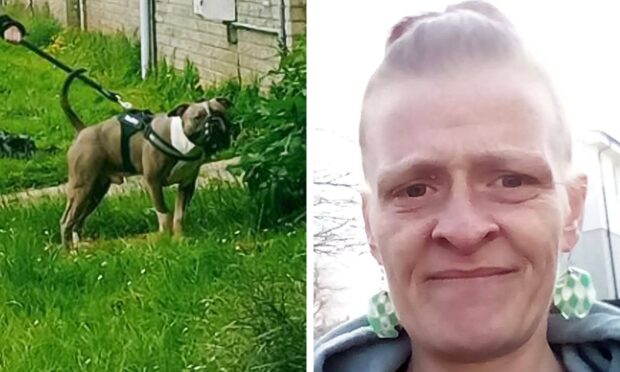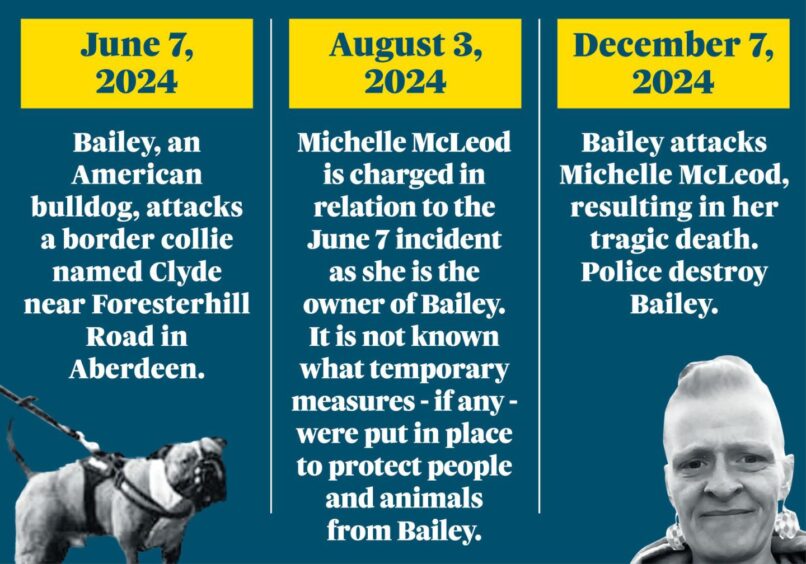On Sunday morning, residents of an Aberdeen street awoke to a knock at the door from police.
Officers wanted to know if anyone had heard or seen anything late the previous night, when a tragedy took place.
It emerged that 41-year-old Michelle McLeod had been attacked by an American bulldog named Bailey within a flat on Foresterhill Road.
And now, questions have been raised about whether the attack could have been prevented.
What happened on Saturday night?
A police investigation is under way and officers have released limited details about what happened.
But we know that a man who lived within the flat awoke to the sound of a woman in distress in the next room at 11.15pm.
That woman was Michelle McLeod.
The man came to her assistance and called 999.
It emerged that Michelle had sadly been the victim of a vicious dog attack by Bailey and she could not be saved despite the best efforts of paramedics.
Ms McLeod’s family said in a statement: “She was a much-loved mother, daughter and friend to many and will be sorely missed by all who knew her”.
They added: “We are devastated by the loss of Michelle.”
One source close to the incident told us: “When I found out, I wasn’t surprised.
“In fact, the only thing that surprised me is that Bailey killed her rather than someone else.”
That was because Michelle was Bailey’s keeper – and she had looked after him for the previous nine months.
When did the dog first arrive in the area?
According to neighbours, Bailey was first spotted in the area around March.
Michelle had recently moved into flats there and was living with a man.
While Michelle told people in the area that the man was Bailey’s owner, she was the one who mainly walked Bailey.
People we have spoke to said that, over the summer, they spotted Michelle struggling to keep full control of Bailey, due to the animal’s weight, size and mobility.
But there were no incidents reported to the police or dog warden until June.
What happened in June?
On Friday June 7, Foresterhill Road resident Klaudia Jackowska was walking her 10-year-old sheepdog Clyde in a communal garden.
Bailey ran towards Clyde and started to bite him.
According to Klaudia, it took four people – Klaudia, her partner and two passersby – to pull Bailey off Clyde.
She then took Clyde to the vets for treatment.
Horrified by the attack – and worried that it might happen again – Klaudia reported the matter to the police.
The police informed Aberdeen City Council’s dog warden about the incident – but she did not attend right away.
Why is that significant?
According to Klaudia, the dog warden emailed her several times over the course of the next week and twice delayed attending.
The dog warden turned up on June 14, Klaudia said – by which time Clyde’s injuries were almost healed.
Klaudia, 23, told us: “It happened on a Friday, so maybe they couldn’t come because the next day was the weekend.
“The dog warden told us she was particularly busy around that time and said she would come on the Monday but then it was Wednesday and actually it was Friday.
“By then, Clyde was much better – and the four people, including myself, who had pulled Bailey off Clyde had also been injured, but those injuries were better.
“Perhaps if the dog warden had come out on the same day, they might have seen the injuries and taken stronger action.”
What did the dog warden do?
We asked Aberdeen City Council that but a spokeswoman said they were unable to comment as there is an ongoing police investigation.
It is understood that the dog warden visited Michelle and inspected Bailey’s state of mind and living conditions.
The dog warden recommended that, when outside, Bailey wear a muzzle and be kept on the lead at all times.
This was understood to be the arrangement put in place until the police’s investigation into Bailey’s attack on Clyde concluded.
But there was nothing legally binding – and the council did not communicate those conditions to neighbours, so they had no way of knowing if there was a breach of conditions.
Did Bailey’s owners follow restrictions?
According to neighbours – sometimes.
Often, they would see Michelle struggling to control Bailey.
Sometimes Bailey would have a muzzle on, but not be on a lead, or vice versa.
The neighbours didn’t know this was against the wishes of the dog warden – but they did speak about their concerns on social media.
On July 22, Klaudia wrote: “The owners don’t fit the muzzle properly dog also gets out twice a day to the top of the back garden and back again.
“Neither of the owners can hold him back when he goes wild.”
At the time, Klaudia was predicting a tragedy might happen unless the dog warden acted.
She told us: “I would not advocate for a dog being euthanised because it is not fair on the poor animal.
“But, in this case, the dog warden could have insisted the dog was retrained and then assessed the outcome of the training afterwards.
“Or she could have just taken the dog out of their care for retraining.”
Neither of those two options were taken up.
What happened with the police probe?
Police investigated the June 7 attack by Bailey on Clyde and prepared a file for the Crown Office.
In response to that, a 41-year-old woman – understood to be Michelle McLeod – was charged in connection to the incident.
That charge was brought on August 3.
The Crown Office would not tell us what happened with that case.
However, we know that, at the time of Michelle’s death on Saturday, the case had not reached court.
And, since Bailey was destroyed, the court case is now null and void.
So could the attack on Michelle been prevented?
Had the dog warden imposed stronger restrictions on Bailey after the June attack on Clyde, the tragedy could have been prevented.
Had Bailey been removed from Michelle’s custody or destroyed, she would still be alive.
However, it is complicated by several factors.
Firstly, dog wardens need a high level of evidence to justify removing or destroying a dog without the order of a court sheriff.
And secondly, neighbours told us that, during the autumn and winter months, Michelle started to walk Bailey in quieter areas.
So Bailey was not around other people or dogs as a result and there were fewer spark points.
Had concerned neighbours flooded the council with concerns about Bailey, further action would have been taken – but that did not happen.
But questions remain: Why did it take the dog warden a week to visit Klaudia Jackowska and why was Bailey not taken away?
Do the dog wardens have too high a workload to make time-sensitive decisions quickly enough?
What do the authorities involved say?
We put all of these issues to Aberdeen City Council, whose spokeswoman said: “Unfortunately we are unable to comment on any ongoing police matters.”
The Crown Office does not comment on closed or historic cases.
A Police Scotland spokesman said: “Enquiries are ongoing. Anyone with any concerns can speak to officers.”





